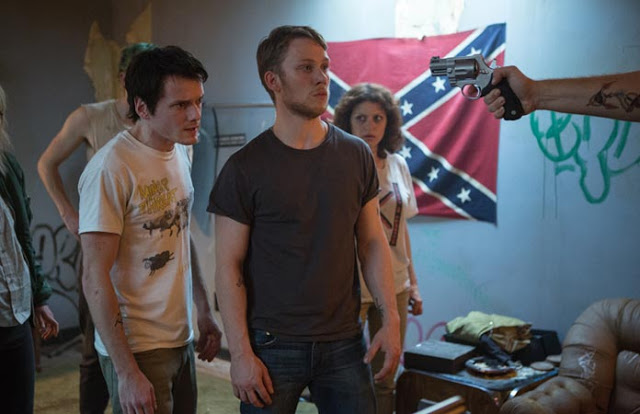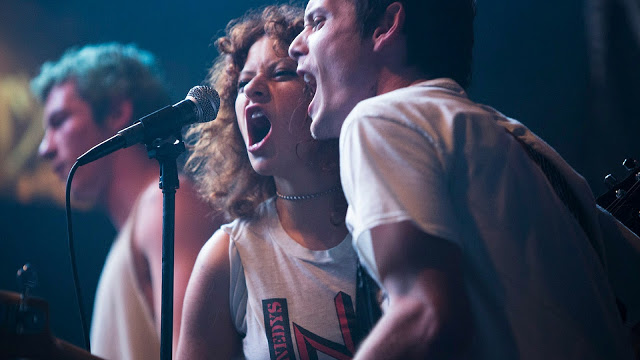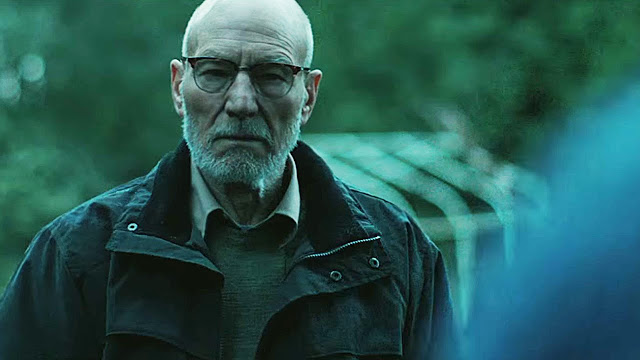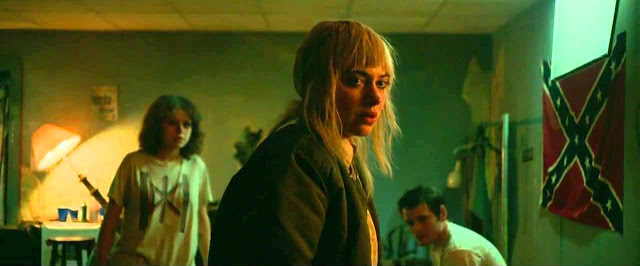“When you take it all virtual, you lose the texture,” Pat says early in Green Room, Jeremy Saulnier’s lean, nasty, uncompromising new thriller. Pat, played by the squirrelly actor Anton Yelchin, is speaking about his band’s grass-roots approach to music, but he’s also serving as a mouthpiece for his writer-director. A roughneck at heart, Saulnier doesn’t so much defy cinema’s technological advances—like most low-budget filmmakers, he shoots in digital, a relatively newfangled technique—but exploits them to make movies that are primal and proudly unpolished. His previous feature, Blue Ruin, embraced a popular genre (the revenge picture) while simultaneously upending that genre’s conventions, but it was most noticeable for its atmosphere, a queasy aura of sweat, grime, and helpless panic. Now he brings us Green Room, a terror film about a handful of people locked in a tiny space, desperate to escape. Its setup is familiar, but its execution is marvelously visceral. The result is both exhilarating and oddly strangulating—you cannot help but enjoy this movie’s assaultive body blows, even as its hands begin to tighten around your neck.
Pat is the bassist for the Ain’t Rights, a punk-rock four-piece also featuring lead singer Tiger (Callum Turner), guitarist Sam (Alia Shawkat, miles from her iconic role on Arrested Development), and drummer Reece (Joe Cole, from the BBC’s Peaky Blinders). They’re touring the Pacific Northwest, though “touring” is a generous term for their ritual, which consists of scrounging for gigs at sparsely populated clubs and siphoning gas from parked cars to keep their rundown van moving. After plowing through a particularly humiliating performance that nets them six bucks apiece, they get wind of another opportunity outside nearby Portland, which they accept eagerly. When they arrive at the venue—a backwoods bar just east of nowhere—they discover that they’ve been mislabeled “The Aren’t Rights” and, more disconcertingly, that the place is populated by skinheads and is adorned with Nazi paraphernalia. Being iconoclasts, they settle on a special number for the opening song of their set: a cover of Dead Kennedys’ “Nazi Punks Fuck Off!”.
That’s a dubious decision, but it isn’t what gets them into trouble. In fact, once the band moves on to its original material, the crowd actually warms to their hard-edged sound, and Saulnier even indulges in a rare flourish, capturing Pat rocking out in slow motion, sweat streaming off his brow, lost in the ecstasy of making art. In a sense, it’s an unspoken commentary on the unifying power of music and how it can bridge philosophical divides. But then, some distances are a bridge too far, as the Ain’t Rights discover when Pat, retrieving Sam’s forgotten cell phone, wanders back into the titular room and sees the lifeless body of a young woman sprawled on the floor, a knife jammed into the side of her head. Several seconds, screams, and expletives later, the Ain’t Rights find themselves locked inside the green room, a hulking neo-Nazi bouncer looming over them with a pistol and a scowl. As the Aryans might say: scheisse.
At this point, Green Room‘s tone shifts from jittery anxiety to full-fledged terror, but wisely, Saulnier doesn’t pile on the crazy too heavily. There’s something weirdly realistic about his approach to horror, a commitment to authenticity amid the nightmare. Sure, he wants to petrify his audience, but what really interests him is exploring how ordinary people respond when facing extraordinary circumstances. The members of the Ain’t Rights aren’t heroes, at least not in the traditional sense. They’re just musicians: tired, strung-out, and clinging to life because they’d rather not die. A different director may have been tempted to turn one of his potential victims into a flame-throwing force of retribution—indeed, Adam Wingard achieved considerable success with this approach in his underrated home-invasion picture, You’re Next—but Saulnier, like his punk-rockers, wants to keep it real. And while Green Room chronicles events that are downright appalling, the most disturbing thing about it is that it seems so plausible.
If this movie is, above all, an exercise in ruthless efficiency, then its standard-bearer is surely Darcy, the bar’s owner and the neo-Nazis’ remorseless commandant. Darcy is played, in a masterstroke of casting, by Patrick Stewart, an actor whose patrician accent and classical bona fides automatically lend him an authoritative elegance. Stewart plays deliciously against type here, retaining his usual superiority but distorting it in terrifying ways. After being apprised of the situation, Darcy makes a split-second decision—the Ain’t Rights have to die—then begins calculating just how that eventuality should come to pass. Darcy is hopelessly amoral, but he’s also considerably smarter than everybody else on screen, and Stewart communicates his vast intelligence with supreme ease.
Much blood is spilled in Green Room, but the film’s best scenes involve Darcy negotiating through the title location’s heavy metal door with the Ain’t Rights, who try to temper their adrenaline-fueled panic with rationality. It’s a twisted chess game in which one side has virtually all the pieces, but the musicians hold their own. It helps that they’re joined by Amber (Imogen Poots, excellent), a seeming confederate of the neo-Nazis—Saulnier isn’t all that interested in spelling out details—who nevertheless finds herself captive alongside the frantic quartet. This extended sequence—which involves, among other things, five bullets, two chokeholds, and one sickeningly snapped arm—is unbearably tense, as the Ain’t Rights (maybe they should be renamed “Amber and the Ain’t Rights”?) gradually gain more information and discern the depths of their dilemma. But again, as heightened as everything is, it is also fiercely believable, a logical construction of how such an ordeal might play out. In one inspired moment, Darcy suddenly lowers his voice because he’s “growing a bit hoarse”, then politely asks if the band can still hear him through the door. That level of verisimilitude roots Green Room in reality, pulling you inside its four walls alongside its characters.
Admittedly, the movie fares better inside the green room than out. Saulnier favors economy over clarity, which helps Green Room‘s pacing but also muddles its narrative. The neo-Nazis are scary dudes, but there are a few too many of them (including one played by Macon Blair, the lead in Blue Ruin), and it can be difficult for the audience to grasp Darcy’s brusque orders. And while Saulnier ingeniously devises an excuse to prevent the movie from turning into a banal firefight, his communication of that concept could have been clearer.
At the same time, Saulnier does a commendable job carrying Green Room to its gruesome conclusion without its energy flagging. With any film like this, dissipation of tension is inevitable; the simmering threat of violence erupting is always more nerve-wracking than the ultimate eruption of that violence. But if the movie predictably devolves into a series of gory encounters, it at least stages those clashes with wit and verve. This is most evident in the film’s use of weaponry. Some of the baddies are fortunate enough to arm themselves with shotguns and pit bulls, but the Ain’t Rights are forced to improvise, and they make impressively lethal use of a variety of objects: a box cutter, a fire extinguisher, a fluorescent light panel, even a microphone. They also have Amber, and if Green Room cements Stewart’s ability to wield his gifts for villainy, it also announces Poots as an actress with dynamic screen presence.
There’s a runner in Green Room about the different musicians’ “desert island band”; while they initially feel compelled to name punk-rock legends, one of them eventually blurts out, “Simon and Garfunkel!” That’s a blackly comic moment, but it’s also in keeping with the movie’s spirit of honesty, and its inclusion makes this sharp, vicious thriller no less raw. Pat may be worried about his art losing texture, but Green Room proves that Saulnier—unlike his characters, and his audience—has nothing to fear.
Jeremy Beck is the editor-in-chief of MovieManifesto. He watches more movies and television than he probably should.




